-
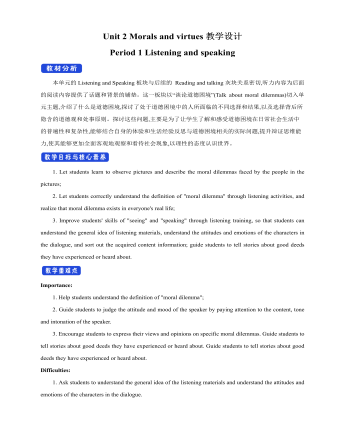
新人教版高中英语必修3Unit 2 Morals and virtues教学设计一
(2) students are divided into groups according to the requirements of activity 3. Each student shares a story of personal experience or hearing-witnessing kindness, and then selects the most touching story in the group and shares it with the whole class. Before the students share the story, the teacher can instruct them to use the words and sentence patterns in the box to express. For example, the words in the box can be classified:Time order: first of all, then, after that, later, finally logical relationship :so, however, although, butTeachers can also appropriately add some transitional language to enrich students' expression:Afterwards, afterwards, at last, in the end, eventuallySpatial order: next to, far from, on the left, in front ofOtherwise, nevertheless, as a result, therefore, furthermore, in addition, as well asSummary: in a word, in short, on the whole, to sum up, in briefStep 8 Homework1. Understand the definition of "moral dilemma" and establish a correct moral view;2. Accumulate vocabulary about attitudes and emotions in listening texts and use them to express your own views;3. Complete relevant exercises in the guide plan.1、通过本节内容学习,学生能否理解理解“道德困境”的定义;2、通过本节内容学习,学生能否通过说话人所表达的内容、说话的语气、语调等来判断其态度和情绪;3、通过本节内容学习,学生能否针对具体的道德困境发表自己的看法和见解,能否掌握听力理训练中的听力策略。
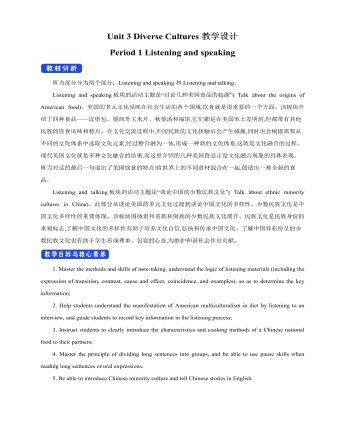
新人教版高中英语必修3Unit 3 Diverse Cultures教学设计一
Activity 81.Grasp the main idea of the listening.Listen to the tape and answer the following questions:Who are the two speakers in the listening? What is their relationship?What is the main idea of the first part of the listening? How about the second part?2.Complete the passage.Ask the students to quickly review the summaries of the two listening materials in activity 2. Then play the recording for the second time.Ask them to complete the passage and fill in the blanks.3.Play the recording again and ask the students to use the structure diagram to comb the information structure in the listening.(While listening, take notes. Capture key information quickly and accurately.)Step 8 Talking Activity 91.Focus on the listening text.Listen to the students and listen to the tape. Let them understand the attitudes of Wu Yue and Justin in the conversation.How does Wu Yue feel about Chinese minority cultures?What does Justin think of the Miao and Dong cultures?How do you know that?2.learn functional items that express concerns.Ask students to focus on the expressions listed in activity. 3.And try to analyze the meaning they convey, including praise (Super!).Agree (Exactly!)"(You're kidding.!)Tell me more about it. Tell me more about it.For example, "Yeah Sure." "Definitely!" "Certainly!" "No kidding!" "No wonder!" and so on.4.Ask the students to have conversations in small groups, acting as Jsim and his friends.Justin shares his travels in Guizhou with friends and his thoughts;Justin's friends should give appropriate feedback, express their interest in relevant information, and ask for information when necessary.In order to enrich the dialogue, teachers can expand and supplement the introduction of Miao, dong, Lusheng and Dong Dage.After the group practice, the teacher can choose several groups of students to show, and let the rest of the students listen carefully, after listening to the best performance of the group, and give at least two reasons.
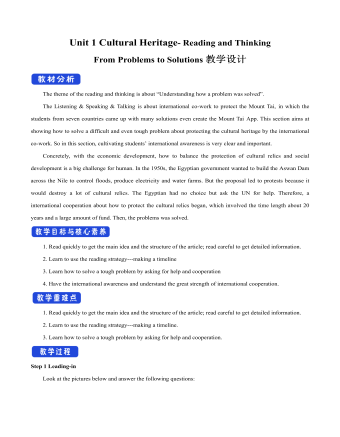
新人教版高中英语必修2Unit 1 Cultural Heritage-Reading and Thinking教案一
The theme of the reading and thinking is about “Understanding how a problem was solved”.The Listening & Speaking & Talking is about international co-work to protect the Mount Tai, in which the students from seven countries came up with many solutions even create the Mount Tai App. This section aims at showing how to solve a difficult and even tough problem about protecting the cultural heritage by the international co-work. So in this section, cultivating students’ international awareness is very clear and important. Concretely, with the economic development, how to balance the protection of cultural relics and social development is a big challenge for human. In the 1950s, the Egyptian government wanted to build the Aswan Dam across the Nile to control floods, produce electricity and water farms. But the proposal led to protests because it would destroy a lot of cultural relics. The Egyptian had no choice but ask the UN for help. Therefore, a international cooperation about how to protect the cultural relics began, which involved the time length about 20 years and a large amount of fund. Then, the problems was solved. 1. Read quickly to get the main idea and the structure of the article; read careful to get detailed information.2. Learn to use the reading strategy---making a timeline3. Learn how to solve a tough problem by asking for help and cooperation4. Have the international awareness and understand the great strength of international cooperation.1. Read quickly to get the main idea and the structure of the article; read careful to get detailed information.2. Learn to use the reading strategy---making a timeline.3. Learn how to solve a tough problem by asking for help and cooperation.

新人教版高中英语必修2Unit 2 Wildlife Protection-Reading and Thinking教案一
The listening and speaking part aims at how to protect and help endangered animals by listening, speaking and talking about the facts and reasons. This lesson analyzes the decreasing clause of Tibetan antelope population and the measures of protecting Tibetan antelopes. So students can be guided to learn to analyse the title and use different reading skills or strategies, like scanning, skimming and careful reading.1. Read quickly to get the main ideas and the purpose of going to Tibetan; read carefully to understand what the author see and think.2. Understand the sentences of the present continuous passive voice such as “Much is being done to protect wildlife.” and the inverted sentence “Only when we learn to exist in harmony with nature can we stop being a threat to wildlife and to our planet.”3. Enhance the awareness of protecting wildlife.4. Cultivate the reading methods according to different materials.1. Read quickly to get the main ideas and the purpose of going to Tibetan; read carefully to understand what the author see and think.2. Understand the sentences of the present continuous passive voice such as “Much is being done to protect wildlife.” and the inverted sentence “Only when we learn to exist in harmony with nature can we stop being a threat to wildlife and to our planet.”3. Cultivate the reading methods according to different materials.Step 1 Leading-inWatch a video about elephants and whales and then ask:Why are they endangered ? They are killed/hunted

新人教版高中英语必修2Unit 3 The Internet-Listening &Speaking&Talking教案一
Listening and Speaking introduces the topic of “ask about online habits”. Many middle school students have been surfing the Internet for many years, but what they do with the Internet and how much time they spend every day may not be very clear to themselves, nor to other students. This section allows students to investigate their peers' Internet use, which is conducive to their mutual understanding and understanding of the Internet. It can also help them reflect on their own online behavior, learn from other people's good online habits, and get rid of their bad online behavior.The listening text of this section is an investigation interview. The investigators interview specific groups with the same questions to obtain information, so as to understand their views, practices or attitudes on this issue. There are two specific questions: “how much time do you spend online every day? What do you usually do online?”. The answers of the three respondents provide rich and different information, and achieve the purpose of the investigators. The oral discourse structure of survey interviews generally includes greeting and explaining the purpose of the interview, presenting the interview questions and the respondents' answers. Listening and Talking introduces the theme of “choosing the right application ". Listening text is a conversation between Laura and Xiao Bo. In this part of listening, “oink”; “piggy bank” may cause the students' hearing comprehension limitation. Oink refers to sound word and pig's sound. So, add some oink to my piggy bank is often used to describe "making a little money".1. Guide students to understand the content of listening texts in terms of listening for definitions.2. Cultivate students' ability to define words and understand an investigation interview.

新人教版高中英语必修2Unit 4 History and Traditions-Discovering Useful Structure教案一
Step 5 Practice一、完成下列句子。1. Judy and I _______________(把车停下来(park))in an underground car Park near Trafalgar Square, where we could ______________________(让我们的车充电(charge)).2. When we finally reached the service desk to ask for audio guides, we heard it ___________ that there were no audio guides____________(留下,剩下).3. We__________________________(发现自己对...很惊讶)the large number of visitors and the amount of noise at the entrance of the National Gallery.4. Judy ____________________(眼神专注于) Van Gogh’s Sunflowers. It was hard to approach the painting as there were so many people around.5. She ____________________(把这幅画的复制品装箱(box)) to ensure that it was delivered safely.答案:1.had our car parked get our car battery charged 2. announced left 3. found ourselves very surprised 4. had her eyes fixed on 5. had a copy of the painting boxed二、用过去分词对下列句子进行改写。1. Loch Ness was surrounded by beautiful natural landscape, which made it look amazing.2. Carl and his friend stayed with a generous family who offered them bread with butter and honey that was homemade.3. The family’s ancestors once attended to soldiers who were wounded in the First World War.4. The young people were attracted by the legend of Loch Ness. They watched over the lake with their cameras and binoculars, which were positioned on the hill.答案:1. Loch Ness surrounded by beautiful natural landscape looks amazing.2. Carl and his friends stayed with a generous family who offered them homemade bread with butter and honey.3. The family’s ancestors once attended to wounded soldiers in the First World War.4. The young people attracted by the legend of Loch Ness watched over the lake with their cameras and binoculars positioned on the hill.

新人教版高中英语必修2Unit 3 The Internet-Reading and Thinking教案一
Paragraph 3. Jan decided to start an IT club to teach old people how to use computers and the Internet. Paragraph 4. Jan has started taking online classes to learn more about how to use the Internet to make society better. Paragraph 5. Jan’s life has been greatly improved by the Internet. Step 5: Critical thinking:(1)How do you arrange your time spent on study and the Internet? Is it reasonable? I usually surf the Internet using my mobile phone for only an hour after class, and it is reasonable for me.(2)What are your online activities? Are they safe? I chat with my friends, read news and play games. I never give away my private information so I think they are safe.Step 4: summary Much has been written about the wonders of the World Wide Web. There are countless articles (1)______(tell) us how the Internet has made our lives more convenient. But the Internet has done a lot (2)_____(much) for people than simply make life more convenient. People’s lives (3) _________________(change) by online communities and social networks so far. Take Jan for example, who developed a serious illness that made her (4)_____(stick) at home with only her computer to keep (5)___(she) company. She joined an online group (6)______ she could share problems, support and advice with others. She considered the ability to remove the distance between people as one of the greatest (7)_______(benefit). She was so inspired (8)____ she started an IT club in which many people have been helped. She has started to learn more about how to use the Internet to make society better. Her next goal is to start a charity website to raise money (9)___ children in poor countries. Jan’s life has been (10)______(great) improved by the Internet. Step 5 Homework:Review what we have learned and find out the key language points in the text.

新人教版高中英语必修2Unit 4 History and Traditions-Listening&Speaking&Talking教案一
This unit is about history and traditions. From the opening page, we can know that this unit will introduce the history and traditions around the world. As Marcus Garvey says “A people without the knowledge of their past history, origin and culture is like a tree without roots”, it is important for students to realize the importance and value of knowing the history and traditions and their further meanings. And this part ( listening and speaking ) is divided into two parts: Part A---share views on historic sites, Part B ---talk about a visit to a historic tourist destination. By talking with a foreigner, the speakers introduce the historic attractions and their cultures. Part A is that William, a British student, who was going to visit the Confucius Temple and a Chinese student, Xiao Kong, who was going to the Confucius Temple to meet with the members of the research group, went together and exchanged their views on the Confucius Temple, Confucius, Confucius' descendants and Confucius' educational thoughts. Part B is a conversation between Xiao Yan, a youth hostel receptionist and Paul, a backpacker about the feelings and experience after visiting the Chinese famous tourist attraction Pingyao.1. Guide students to understand the content of listening texts in terms of the whole and key details; 2. Cultivate students' ability to guess the meaning of words in listening; discuss with their peers how to talk about historic spots and great person.3. Instruct students to use functional sentences of showing one’s excitement, surprise and disappointment.1. Guide students to understand the content of listening texts in terms of the whole and key details; 2. Cultivate students' ability to discuss with their peers the related topics.3. Enable students to use the functional items of showing one’s excitement, surprise and disappointment.

新人教版高中英语必修2Unit 3 The Internet-Reading For Writing教案一
⑦identity theft 身份盗窃⑧chat room 聊天室⑨draft your blog post 起草博客帖子⑩post embarrassing photos 张贴尴尬照片 【话题句式】 1. How do you stay safe online and avoid bad experiences on the Internet? 你如何在网上保持安全, 避免在网上的不良经历? 2. I’m not an expert, but many years as a blogger have taught me a thing or two. 我不是专家, 但作为一个博主, 我已经学了好几年了。 3. If you see or read something that makes you feel uncomfortable, leave the site immediately. 如果你看到或读到一些让你觉得不舒服的东西, 立即离开这个网站。4. Don’t give out your address or phone number. 别告诉别人你的地址或电话号码。 5. Identity theft is a common and serious problem. 身份盗窃是一个常见而严重的问题。6. Being online is no excuse for being rude, and you don’t want to become a target for a troll or cyberbully. 上网并不是无礼的借口, 你也不想成为发挑衅帖子的人或网络恶霸的目标。 7. Trolls often use several false names so that they can stay on a site. 发挑衅帖子的人经常使用几个假名, 这样他们就可以留在一个网站上。8. However, the more polite you are, the less likely it is you will be attacked. 然而, 你越有礼貌, 你被攻击的可能性就越小。

新人教版高中英语必修2Unit 4 History and Traditions-Reading and Thinking教案一
Features of languages1.Finally, in the 20th century, the southern part of Ireland broke away from the UK, which resulted in the full name we have today: the United Kingdom of Great Britain and Northern Ireland.该句是一个复合句。该句主句为:the southern part of Ireland broke away from the UK;which resulted in the full name we have today为which引导的定语从句代指前面整句话的内容,we have today为定语从句修饰先行词name。译文:最后,在20世纪,爱尔兰南部脱离英国,这导致了我们今天有的英国的全名:大不列颠及北爱尔兰联合王国。2.Almost everywhere you go in the UK, you will be surrounded by evidence of four different groups of people who took over at different times throughout history.该句是一个复合句。该句主句为:you will be surrounded by evidence of four different groups of people;其中Almost everywhere you go in the UK为让步状语从句; who took over at different times throughout history为定语从句修饰先行词people。译文:几乎无论你走到英国的任何地方,你都会发现历史上有四种不同的人在不同的时期统治过英国。3.The capital city London is a great place to start, as it is an ancient port city that has a history dating all the way back to Roman times.该句是一个复合句。该句主句为:The capital city London is a great place to start; as it is an ancient port city that has a history dating all the way back to Roman times.为原因状语从句;dating all the way back to Roman times为现在分词短语作定语修饰history。
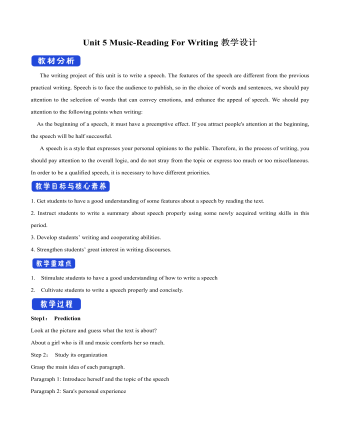
新人教版高中英语必修2Unit 5 Music-Reading For Writing教案一
(4)Now we have heard a number of outstanding speeches ... 我们已经聆听了许多精彩的发言……(5)Because we wanted the nations of the world, working together, to deal with ... 因为我们希望全世界各国团结起来去应对……(6)And if we do not act ... 如果我们不采取行动……(7)Now, I share the concerns that have been expressed ... 我也同意对于……表达的担心(8)Let us show the world that by working together we can ... 让我们告诉全世界,通过一起努力我们可以……(9)It is now time for us to ... 是时候我们……(10)And I have always wished that ... 我一直希望……(11)Thank you for letting me share this day with me.感谢你们和我共度这一天。实践演练:假如你是高中生李华,你校将举办一次以“音乐”为主题的演讲比赛,请你按照主题,写下你的演讲稿。注意:词数100左右。First of all, thank you for listening to my speech. My topic is: love music like love yourself.Music is like the air we need to maintain our normal lives around us. You can't imagine how terrible a world without music would be. Movies and TV shows have no music, only dry conversations and scenes; mobile phones only vibrations; streets only noisy crowds; cafes, western restaurants only depressed meals. What a terrible world it is!As a student, I hope we all can enjoy the fun brought by music in our spare time. Instead of just listening to music, we can even make our own music. Let's enjoy the fun of music!Thanks again for your attention!
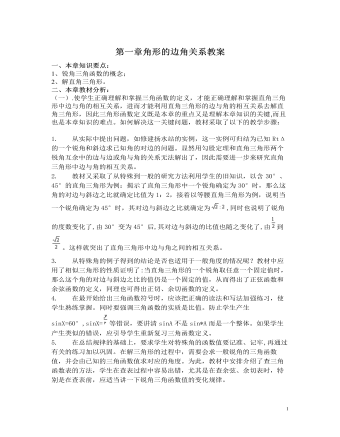
北师大初中九年级数学下册第一章复习教案
一、本章知识要点: 1、锐角三角函数的概念; 2、解直角三角形。二、本章教材分析: (一).使学生正确理解和掌握三角函数的定义,才能正确理解和掌握直角三角形中边与角的相互关系,进而才能利用直角三角形的边与角的相互关系去解直角三角形,因此三角形函数定义既是本章的重点又是理解本章知识的关键,而且也是本章知识的难点。如何解决这一关键问题,教材采取了以下的教学步骤:1. 从实际中提出问题,如修建扬水站的实例,这一实例可归结为已知RtΔ的一个锐角和斜边求已知角的对边的问题。显然用勾股定理和直角三角形两个锐角互余中的边与边或角与角的关系无法解出了,因此需要进一步来研究直角三角形中边与角的相互关系。2. 教材又采取了从特殊到一般的研究方法利用学生的旧知识,以含30°、45°的直角三角形为例:揭示了直角三角形中一个锐角确定为30°时,那么这角的对边与斜边之比就确定比值为1:2。
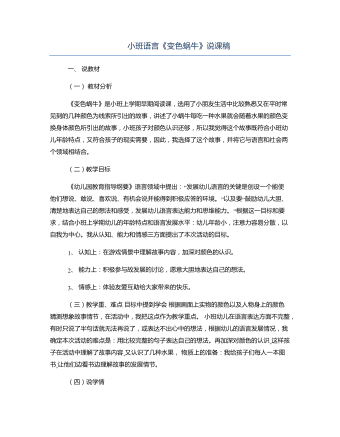
小班语言《变色蜗牛》说课稿
《幼儿园教育指导纲要》语言领域中提出:“发展幼儿语言的关键是创设一个能使他们想说、敢说、喜欢说、有机会说并能得到积极应答的环境。”以及要“鼓励幼儿大胆、清楚地表达自己的想法和感受,发展幼儿语言表达能力和思维能力。”根据这一目标和要求,结合小班上学期幼儿的年龄特点和语言发展水平:幼儿年龄小,注意力容易分散,以自我为中心。我从认知、能力和情感三方面提出了本次活动的目标。1、认知上:在游戏情景中理解故事内容,加深对颜色的认识。2、能力上:积极参与故发展的讨论,愿意大胆地表达自己的想法。3、情感上:体验友爱互助给大家带来的快乐。
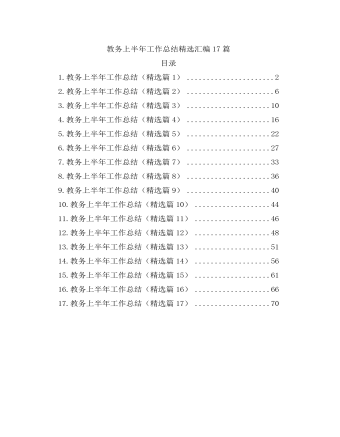
教务上半年工作总结精选汇编(17篇)
一、加强教学管理和教学研究,进一步深化课堂教学改革1、夯实课改,进取推进新课标实施进程。作为改革实验学校,教务处继续进取认真组织全体教师深入学习新课标理念,体会新课标精神,明确新课标要求,面向全体学生,改变学习方式。良好的教研氛围,提高了教育教学质量。2、继续加强教学管理,完善规章制度,强化教学的规范化、制度化、科学化。加强常规检查,本学期教务处随机抽查、集中检查教师的教案,并进行记录,对存在的问题进行个别反馈。对学科测验、作业批改实施掌控并深入到各年级、班级了解情景。全面了解教学情景,不定时检查教师课堂教学情景,注重教学质量的全过程监控。组织各教研组定期与不定期检查教学计划等。规范学生学习习惯,重点抓好读书、写字的正确姿势,经过开展写字比赛、作业检查等方式进行强化。
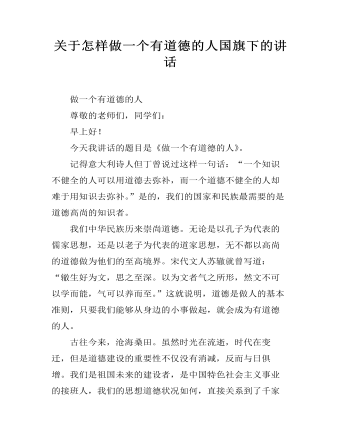
关于怎样做一个有道德的人国旗下的讲话
做一个有道德的人尊敬的老师们,同学们:早上好!今天我讲话的题目是《做一个有道德的人》。记得意大利诗人但丁曾说过这样一句话:“一个知识不健全的人可以用道德去弥补,而一个道德不健全的人却难于用知识去弥补。”是的,我们的国家和民族最需要的是道德高尚的知识者。我们中华民族历来崇尚道德。无论是以孔子为代表的儒家思想,还是以老子为代表的道家思想,无不都以高尚的道德做为他们的至高境界。宋代文人苏辙就曾写道:“辙生好为文,思之至深。以为文者气之所形,然文不可以学而能,气可以养而至。”这就说明,道德是做人的基本准则,只要我们能够从身边的小事做起,就会成为有道德的人。
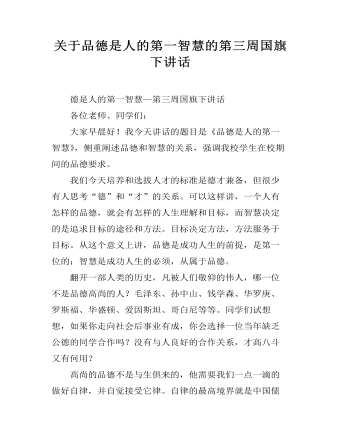
关于品德是人的第一智慧的第三周国旗下讲话
德是人的第一智慧—第三周国旗下讲话各位老师、同学们:大家早晨好!我今天讲话的题目是《品德是人的第一智慧》,侧重阐述品德和智慧的关系,强调我校学生在校期间的品德要求。我们今天培养和选拔人才的标准是德才兼备,但很少有人思考“德”和“才”的关系。可以这样讲,一个人有怎样的品德,就会有怎样的人生理解和目标,而智慧决定的是追求目标的途径和方法。目标决定方法,方法服务于目标。从这个意义上讲,品德是成功人生的前提,是第一位的;智慧是成功人生的必须,从属于品德。翻开一部人类的历史,凡被人们敬仰的伟人,哪一位不是品德高尚的人?毛泽东、孙中山、钱学森、华罗庚、罗斯福、华盛顿、爱因斯坦、哥白尼等等。同学们试想想,如果你走向社会后事业有成,你会选择一位当年缺乏公德的同学合作吗?没有与人良好的合作关系,才高八斗又有何用?高尚的品德不是与生俱来的,他需要我们一点一滴的做好自律,并自觉接受它律。自律的最高境界就是中国儒家文化强调的“慎独”,即一个人独处时也能保持同样的高尚品德境界,而不是没人看见就随手扔垃圾,随性破坏公物或干点什么见不得人的坏事。
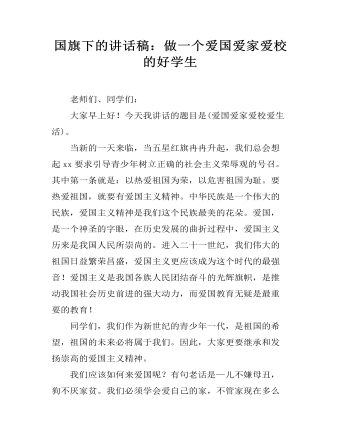
国旗下的讲话稿:做一个爱国爱家爱校的好学生
老师们、同学们:大家早上好!今天我讲话的题目是(爱国爱家爱校爱生活)。当新的一天来临,当五星红旗冉冉升起,我们总会想起xx要求引导青少年树立正确的社会主义荣辱观的号召。其中第一条就是:以热爱祖国为荣,以危害祖国为耻。要热爱祖国,就要有爱国主义精神。中华民族是一个伟大的民族,爱国主义精神是我们这个民族最美的花朵。爱国,是一个神圣的字眼,在历史发展的曲折过程中,爱国主义历来是我国人民所崇尚的。进入二十一世纪,我们伟大的祖国日益繁荣昌盛,爱国主义更应该成为这个时代的最强音!爱国主义是我国各族人民团结奋斗的光辉旗帜,是推动我国社会历史前进的强大动力,而爱国教育无疑是最重要的教育!同学们,我们作为新世纪的青少年一代,是祖国的希望,祖国的未来必将属于我们。因此,大家更要继承和发扬崇高的爱国主义精神。
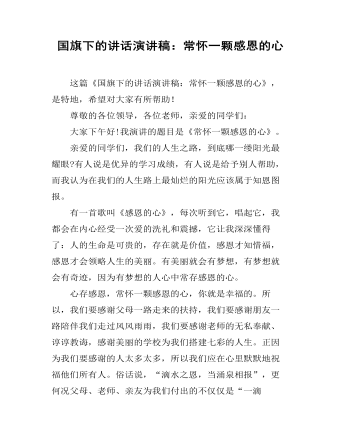
国旗下的讲话演讲稿:常怀一颗感恩的心
这篇《国旗下的讲话演讲稿:常怀一颗感恩的心》,是特地,希望对大家有所帮助!尊敬的各位领导,各位老师,亲爱的同学们:大家下午好!我演讲的题目是《常怀一颗感恩的心》。亲爱的同学们,我们的人生之路,到底哪一缕阳光最耀眼?有人说是优异的学习成绩,有人说是给予别人帮助,而我认为在我们的人生路上最灿烂的阳光应该属于知恩图报。有一首歌叫《感恩的心》,每次听到它,唱起它,我都会在内心经受一次爱的洗礼和震撼,它让我深深懂得了:人的生命是可贵的,存在就是价值,感恩才知惜福,感恩才会领略人生的美丽。有美丽就会有梦想,有梦想就会有奇迹,因为有梦想的人心中常存感恩的心。
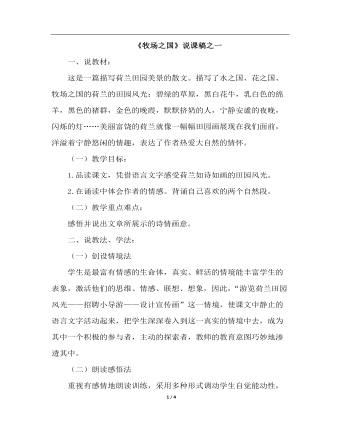
牧场之国(说课稿)
(一)教学目标:1.品读课文,凭借语言文字感受荷兰如诗如画的田园风光。2.在诵读中体会作者的情感。背诵自己喜欢的两个自然段。(二)教学重点难点:感悟并说出文章所展示的诗情画意。二、说教法、学法:(一)创设情境法学生是最富有情感的生命体,真实、鲜活的情境能丰富学生的表象,激活他们的思维、情感、联想、想象,因此,“游览荷兰田园风光——招聘小导游——设计宣传画”这一情境,使课文中静止的语言文字活动起来,把学生深深卷入到这一真实的情境中去,成为其中一个积极的参与者,主动的探索者,教师的教育意图巧妙地渗透其中。(二)朗读感悟法重视有感情地朗读训练,采用多种形式调动学生自觉能动性,使学生在读书中逐步悟出文章所表达的情感,再通过读来表达自己所体验到的情感。同时对学生的朗读要进行适时合理的评价,激发学生向更高的朗读目标努力。
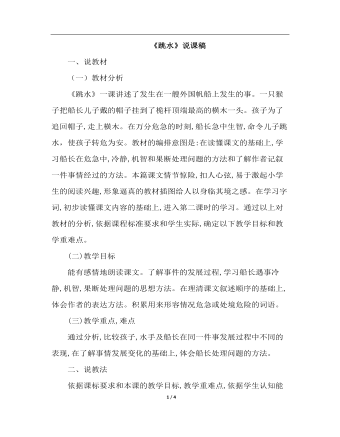
跳水(说课稿)
(二)教学目标能有感情地朗读课文。了解事件的发展过程,学习船长遇事冷静,机智,果断处理问题的思想方法。在理清课文叙述顺序的基础上,体会作者的表达方法。积累用来形容情况危急或处境危险的词语。(三)教学重点,难点通过分析,比较孩子,水手及船长在同一件事发展过程中不同的表现,在了解事情发展变化的基础上,体会船长处理问题的方法。二、说教法依据课标要求和本课的教学目标,教学重难点,依据学生认知能力和已有知识经验,本课教学充分体现"以老师为主导,学生为主体,情感为主线"引导学生积极主动地参与阅读过程采用了以下教学方法: 1.创设情境 2.语言点拨 3.抓重点词句 4.朗读感悟等等。三、说学法:1.抓重点词句,理解感悟:比如"哭笑不得","气极了","惊呆了","40分钟——大家已经觉得时间太长了"。引导学生联系上下文,结合语言环境,对这些词句的未尽之意进行表象理解,体会孩子,水手们的心情。这是在巩固和运用以前的读书方法。2.阅读要有自己的见解:这是在本组课文中学习运用的一种新的读书方法。本课教学中采用了指名读,自由读,默读,齐读,范读等形式,引导学生读书感悟,说出自己的见解。比如:"故事中你获得了哪些有益的启示 "引导学生从几个不同的角色身上去体会。


